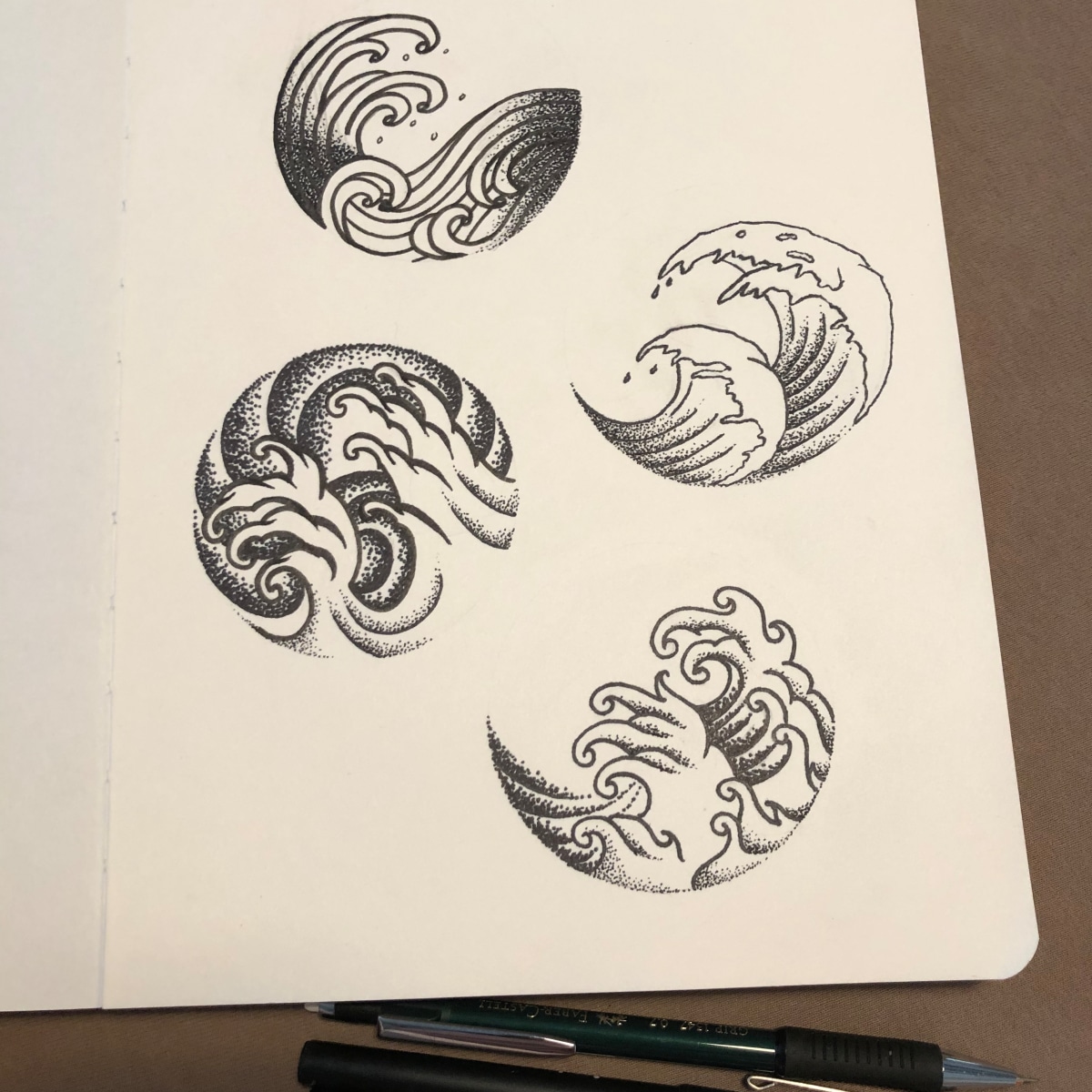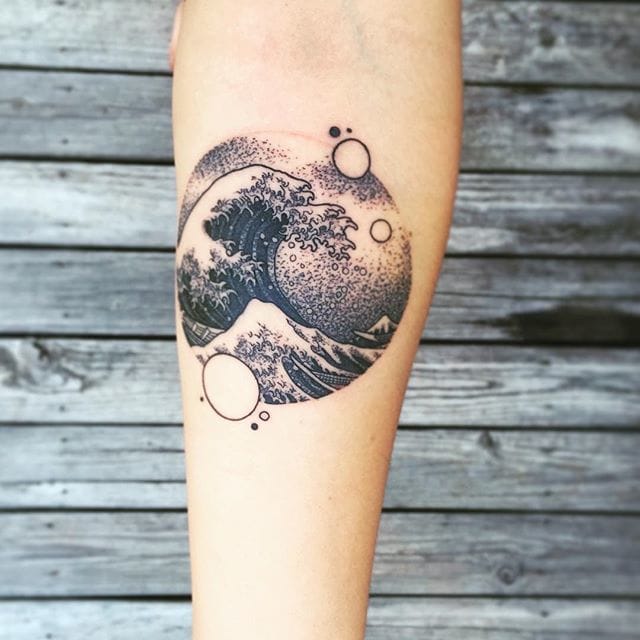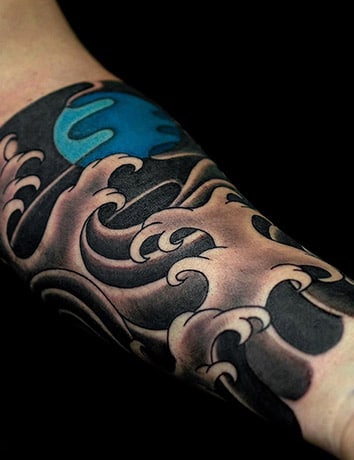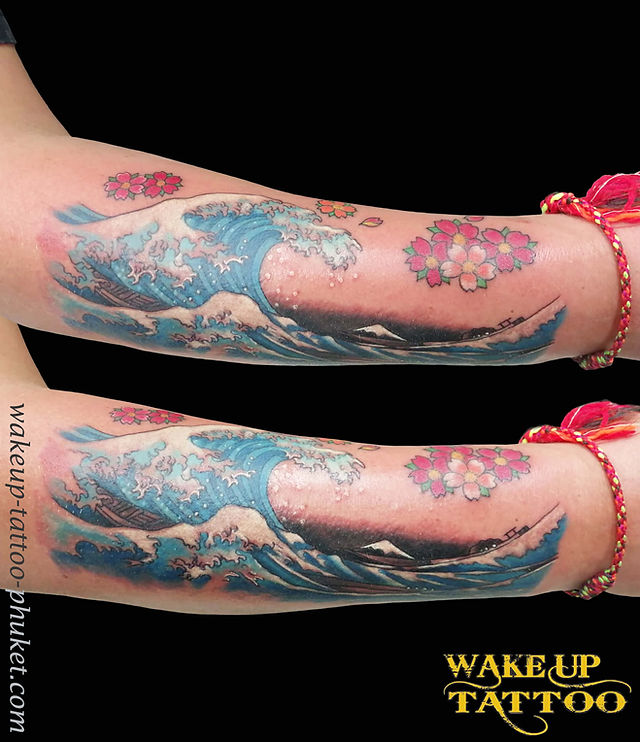Have you ever wondered what the meaning of a Japanese wave tattoo is? Seemingly one of the more popular tattoos around, this type of design has captured the interest of many people. In Japanese culture, the wave has an abundance of symbolism that is deep-rooted in tradition and history. From its aesthetic appeal to its rich historical significance, the Japanese wave tattoo meaning is a fascinating subject to explore.

The Origin of the Japanese Wave Tattoo Meaning
The Japanese wave tattoo design is based on an art form known as ukiyo-e, which originated in Japan during the Edo period. Ukiyo-e artists created woodblock prints and paintings depicting scenes from everyday life, landscapes, and mythical creatures – including waves. The most famous ukiyo-e artist who made waves his signature topic was Katsushika Hokusai, whose artwork influenced Western culture and became an inspiration for Impressionist painters.

What Does the Japanese Wave Tattoo Mean?
The meaning of the Japanese wave tattoo can vary depending on the wearer’s perspective or cultural background. However, in general, the Japanese wave tattoo represents beauty, strength, power, and fluidity. Here are some more detailed interpretations:
Power and Strength
The Japanese Wave tattoo has become increasingly popular in recent years, and it is not difficult to see why. The tattoo is a representation of the power and beauty of the ocean, and it is rich in symbolism and meaning. In Japanese culture, waves are seen as a symbol of strength, resilience, and perseverance.
Waves can be incredibly powerful and destructive, capable of causing massive damage to coastlines and even entire cities. However, despite their destructive potential, waves also represent the underlying power and energy that flows beneath the surface of the ocean. This energy represents the life force that sustains all living things on earth, including humans.
The Japanese have been creating art that depicts waves for centuries. In fact, many famous Japanese artists, such as Katsushika Hokusai, have created stunning works of art that depict waves. These artworks often feature powerful and dramatic waves that tower over ships and people, conveying their sheer strength and resilience.

In Japanese culture, the wave tattoo is often associated with the concept of “mizu no kokoro,” which translates to “a mind like water.” This phrase describes the ability to remain calm and composed in the face of adversity, just as water remains calm and still even in the midst of a storm. The wave tattoo can serve as a reminder to stay grounded and centered during times of stress and tumult.
Another important aspect of the Japanese wave tattoo is its connection to the sea. For centuries, Japan has been a seafaring nation, and the ocean has played a significant role in its culture and history. Waves are a constant reminder of the power and unpredictability of the sea, as well as its beauty and majesty.
Finally, the Japanese wave tattoo can also represent a spiritual connection to nature. Many people who get this tattoo feel a deep connection to the natural world, and they see the wave as a symbol of the cyclical nature of life. Just as waves come and go in the ocean, so too do the ups and downs of life.
In conclusion, the Japanese wave tattoo is a powerful symbol that represents strength, resilience, and perseverance. It is a reminder of the power and beauty of the ocean, as well as our connection to the natural world. Whether you are a seafaring person or simply appreciate the beauty of waves, this tattoo can be a meaningful and inspiring addition to your body art.
Life’s Transience
The Japanese Wave Tattoo is one of the most popular tattoo designs and holds a significant meaning in Japanese culture. The wave symbolizes many things, including the transience of life, strength, and power. This tattoo design is highly sought after by individuals who seek to embody these qualities in their lives.
In Japanese culture, water has always been an integral part of daily life. The country is surrounded by water, and its people have relied on the sea for fishing, trade, and transportation. Waves are seen as an essential part of this relationship with the ocean, and they hold a special meaning in Japanese culture.
The Japanese Wave Tattoo is inspired by traditional Japanese art, specifically the ukiyo-e woodblock prints of the Edo period. These prints often depicted waves and are famous for their intricate details and vibrant colors. It’s not uncommon to see a Japanese Wave Tattoo that incorporates some of these elements, such as the use of bold lines and shading to create a sense of movement and depth.

The meaning behind the Japanese Wave Tattoo can vary from person to person, but generally, it represents the transience of life. The idea is that waves are constantly changing and never stay the same, just like life. They remind us that we should live in the present moment and cherish every experience because nothing in life is permanent.
Furthermore, the wave also represents strength and power. It’s a force of nature that can cause destruction and devastation, but it’s also something that can be ridden and used to propel oneself forward. In this way, the wave can be seen as a metaphor for overcoming challenges and obstacles in life.
In conclusion, the Japanese Wave Tattoo is a beautiful and powerful tattoo design that holds a significant meaning in Japanese culture. It represents the transience of life, strength, power, and the journey of life itself. By embracing these qualities, individuals can embody the essence of the wave and live with more mindfulness and positivity.
Adventurous Spirit
Japanese wave tattoos, also known as “Irezumi,” have become increasingly popular among individuals who love surfing and other water sports. These tattoos often depict the power and beauty of the ocean by featuring strong, dynamic waves that can be both calming and awe-inspiring.
The history of Japanese wave tattoos dates back to ancient Japan when tattoos were used as symbols of power, strength, and courage. The imagery of waves was commonly associated with the sea gods and goddesses, who were revered for their ability to control the tides and protect seafarers. In fact, many traditional Japanese tattoo artists believe that the waves represent the ultimate power of nature, and getting a wave tattoo is a way to pay homage to this force of nature.

In contemporary times, Japanese wave tattoos have taken on new meanings. For surfers and water sport enthusiasts, these tattoos represent a deep connection to the ocean and a love for adventure. Waves are a constant presence in their lives, and getting a wave tattoo can serve as a reminder of the exhilaration and freedom they feel when out on the water. It can also symbolize their desire to stay connected to the ocean and its natural rhythms.
In terms of design, Japanese wave tattoos typically feature intricate detailing and shading, with bold, flowing lines that capture the movement and energy of the waves. Often, these tattoos are done in black and gray ink, although some may incorporate vibrant colors to reflect the beauty of the ocean. Some wave tattoos may also include other elements such as a surfer riding the waves, a ship battling against the stormy seas, or even a dragon or serpent rising from the depths of the ocean.
In conclusion, Japanese wave tattoos have a rich history and deep symbolism that resonates with individuals drawn to surfing and water sports. These tattoos represent a connection to the power and beauty of the ocean, as well as an inner strength and resilience in the face of life’s challenges. Whether done as a small, subtle design or a full-sleeve masterpiece, a Japanese wave tattoo is a celebration of adventure, freedom, and the enduring power of nature.
Yin-Yang Balance
The art of tattooing has been practiced for centuries, and it has evolved over time to become one of the most popular forms of body art today. Among the many types of tattoos, one design that has gained popularity in recent years is the Japanese wave tattoo. This type of tattoo features traditional designs of waves, which have deep cultural significance in Japanese art.
In Japanese culture, waves are a common theme in artwork and have been depicted in various mediums, including paintings, prints, and even clothing. The traditional Japanese wave design often features two waves, one going up and the other going down. This design reflects the concept of yin-yang balance and harmony between opposing forces.

In Japanese philosophy, the concept of yin-yang represents the complementary nature of opposites. Yin is associated with darkness, coldness, and passivity, while yang is associated with light, warmth, and activity. Together, these opposite forces create a harmonious balance in the world.
Japanese wave tattoos often feature both yin and yang elements, with the waves representing the opposing forces of nature. The upward-facing wave symbolizes strength, power, and resilience, while the downward-facing wave represents calmness, peace, and serenity. In this way, the Japanese wave tattoo represents the balance between strength and tranquility, and the importance of finding harmony between seemingly opposing forces.
In conclusion, the Japanese wave tattoo is a beautiful and meaningful design that holds deep cultural significance in Japanese art. Its representation of the yin-yang balance and harmony between opposing forces serves as a reminder of the importance of finding balance in our lives. Whether as a standalone piece or part of a larger design, the Japanese wave tattoo is a timeless and meaningful addition to any tattoo collection.
Connection to Nature
Japanese wave tattoos have been a popular choice for body art enthusiasts for many years. These tattoos not only display beautiful and intricate designs, but they also hold significant meaning for those who choose to adorn them on their skin. The Japanese culture has always had a deep appreciation for nature, and this is evident in their art, literature, and even their tattoos.
A Japanese wave tattoo typically features a large, rolling wave with elements such as foam, fish, or boats incorporated into the design. The waves can be simple or complex, with various shades of blue, green, and gray used to create a realistic depiction of the ocean. These tattoos are often done in traditional Japanese style, with bold lines, minimal shading, and vibrant colors.

The meaning behind Japanese wave tattoos lies in the connection it creates between the wearer and nature. The sea has always been a powerful force that has captivated people’s imaginations and inspired artists to create beautiful works of art. In Japan, the ocean holds a special place in the culture, representing power, strength, and beauty.
When someone gets a Japanese wave tattoo, they are displaying their deep appreciation for the sea and all its elements. This tattoo can be seen as a symbol of resilience, as waves are constantly moving and changing, yet remain strong and powerful despite any obstacles they encounter. It can also represent the cyclical nature of life, where everything ebbs and flows, just like the tides.
Overall, Japanese wave tattoos are a beautiful and meaningful way to connect with nature and appreciate the power and beauty of the sea. They symbolize resilience, strength, and the cyclical nature of life, reminding us to stay strong and persevere through any challenges we may face.
Meaning Behind Different Types of Wave Tattoos
There are several common styles and variations of wave tattoos, each carrying their own unique meanings:
Koi Fish and Waves
Koi fish are a classic Japanese symbol for luck, perseverance, and determination. Combining koi fish with waves illustrates overcoming life’s obstacles with grace and fluidity. Just as koi fish swim against currents, we too must summon our inner strength to push through challenges.
Waves and Mountains
Mountains are grounding symbols representing stillness, inner peace and connection to the Earth. Contrasted with the ever-changing waves, this combination represents finding balance between the fluid and the solid, the temporal and the eternal. It speaks of remaining calm and centered amidst life’s turbulent seas.
Geometric or Tribal Waves
Geometric wave tattoos have a modern, minimalist look. The angular lines represent harnessing the raw power of the ocean through focus and determination. This concept echoes Japanese values of structure, precision and control.
Realistic Waves
Realistic wave tattoos aim to capture the natural beauty and detail of ocean waves on your body. This pays homage to the awesome power of Mother Nature and serves as a grounding reminder of our connection to the element of water.
Yin Yang Waves
Yin yang symbols placed within waves illustrate the concept of opposites in perfect balance – light/dark, life/death, good/bad. It speaks of the harmony between dualities and recognizing life’s ebbs and flows.
Examples of Japanese Wave Tattoos
If you’re looking for inspiration for your next tattoo, here are some stunning examples of Japanese wave tattoos:
- Sleeve: A full arm sleeve tattoo featuring a massive cresting wave with a sun rising behind it.
- Chest: A large chest piece featuring two mirrored waves with koi fish swimming between them.
- Back: An intricate back tattoo featuring a group of crashing waves with cherry blossoms blooming over them.
- Ankle: A delicate ankle tattoo featuring a small wave with sakura petals floating above it.
- Wrist: A minimalist wrist tattoo featuring a small wave with a kanji symbol for water beside it.
Comparisons: Japanese Wave vs. Traditional American Tattoos
Japanese wave tattoos are often compared to traditional American tattoos due to their popularity and iconic status. While both styles have their unique characteristics and meanings, there are some significant differences between the two.
- Subject Matter: Traditional American tattoos often feature bold, graphic designs of animals, symbols, and military themes. Japanese wave tattoos tend to be more fluid and organic, featuring natural elements such as waves, koi fish, and cherry blossoms.
- Color Palette: American tattoos rely heavily on black ink with a limited color palette. In contrast, Japanese wave tattoos can incorporate a range of colors, including blues, greens, pinks, and oranges.
- Meaning: While both styles have deep roots in history and culture, the meaning behind them differs. American tattoos often represent patriotism, loyalty, and honor. Japanese wave tattoos, on the other hand, symbolize strength, beauty, and transience.
Advices for Getting a Japanese Wave Tattoo
If you’re considering getting a Japanese wave tattoo, there are a few things to keep in mind:
- Research: Take your time to research different designs and styles to find one that resonates with you. Look at the work of different tattoo artists and read reviews before choosing someone to do the job.
- Placement: Consider the size and placement of your tattoo carefully, as this can affect the overall look and feel of the design. Think about how visible you want it to be and whether it will fit well with other tattoos you may have.
- Cost: High-quality tattoos can be expensive, but it’s worth investing in a good artist who will create a piece of art that you will love for years to come
Conclusion
The Japanese wave tattoo meaning is both beautiful and complex, reflecting the deep-rooted symbolism of ukiyo-e art and the cultural significance of nature in Japanese culture. Whether you’re drawn to the power and strength of waves or the transience of life they represent, a Japanese wave tattoo can be a stunning piece of art that reflects your personality, values, and spirit of adventure. So do your research, find a talented artist, and wear your Japanese wave tattoo with pride!

I am Harvey Berry, a tattoo enthusiast who has immersed himself in the diverse world of ink, passionately exploring the beauty and artistry within each tattoo. My mission extends beyond uncovering the aesthetics of tattooing; it involves sharing in-depth knowledge across all aspects of this art form.
Fueled by genuine curiosity and love for every facet of tattooing, I have diligently crafted well-researched articles, with a special focus on the Tattoo Meaning of Impeccable Nest section. Here, my aim is to help the tattoo community gain a deeper understanding of the meanings and values embedded in each tattoo.
One of my primary goals is to encourage responsible decision-making when it comes to getting inked. I recognize that choosing to get a tattoo is a significant personal decision that requires careful consideration. Hence, I provide diverse resources covering the meaning of tattoos, the tattooing process, aftercare tips, and other valuable information.
Whether you are a seasoned tattoo enthusiast or embarking on your first exploration of the world of body art, I aspire to be a reliable resource for you at every step of your journey. I hope that my extensive knowledge of tattoos, especially in the Tattoo Meaning section, will assist you in finding inspiration to express yourself through the art of tattoos.
